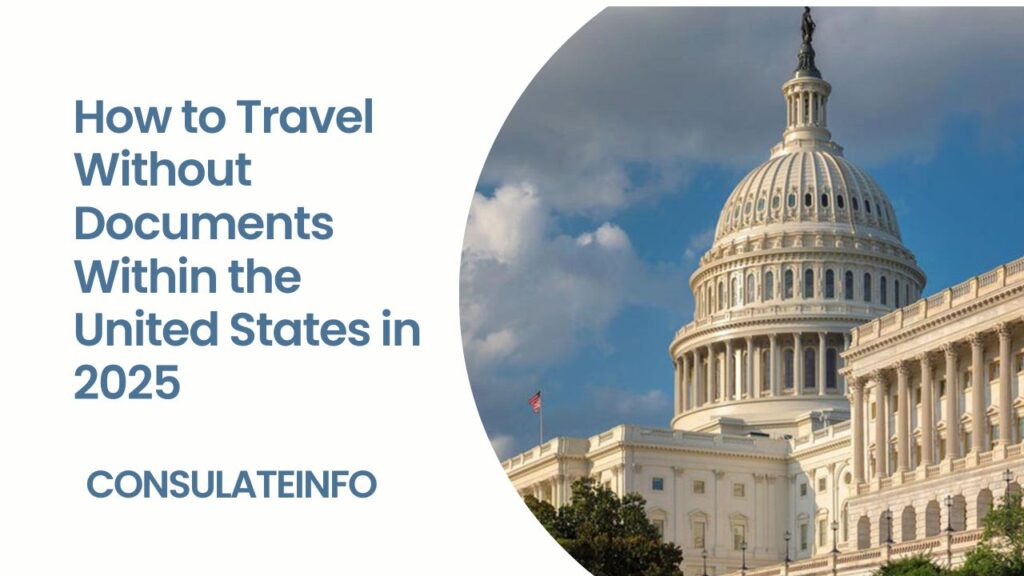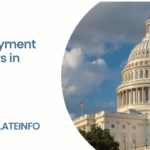Traveling within the United States without proper documentation may seem daunting, but with the right information, the process can be made much safer and easier.
Immigration laws and regulations can be a bit complex, but there are various ways to travel both by land and air. As of 2025, you’ll find everything you need to know to travel safely here. We’re here for you, and we’ll walk you through all the details step by step. If you’re ready, let’s dive into our comprehensive guide.
Undocumented Air Travel
Traveling by air as an undocumented person within the United States can raise concerns about the necessary documents and airport procedures.
However, with the right information and proper preparation, traveling by air within the U.S. is possible. Here’s what you need to know to manage this process safely and smoothly in 2025. Be sure to read until the end.
TSA Accepted Identification
TSA (Transportation Security Administration) accepted identification documents cover the requirements for all passengers on domestic flights.
Although immigration status may limit available identification options, there are still valid documents that undocumented individuals can use to travel by air:
Valid Passport: One of the strongest documents accepted for international travel. A passport is a key document that can be used for identity verification by an undocumented traveler.
State Driver’s License: States like California and New York issue valid driver’s licenses for domestic flights to undocumented individuals, as long as they comply with the Real ID requirements, effective May 3, 2023.
State ID Cards: Some states provide photo ID cards to residents, regardless of immigration status. It’s important to check if your state offers this option and whether it meets Real ID standards, which is at your discretion.
Employment Authorization Document (EAD): This card, issued by USCIS, is a valid form of identification accepted by TSA. It’s applicable to undocumented workers.
Trusted Traveler Cards: Cards from programs like NEXUS, SENTRI, or FAST are accepted by TSA. These cards indicate pre-approved security clearance levels and allow for faster passage through security.
Preparing for Your Domestic Flight
Before heading to the airport, make sure to check the following:
- Name Match: Verify that the name on your ticket exactly matches the name on your ID. Any inconsistencies could cause issues during check-in or security screening.
- Device Security: While you may not be asked to provide a password, it’s recommended to secure your personal information on electronic devices. Consider using alphanumeric passwords instead of biometric ones for added protection.
- Emergency Contacts: Identify reliable people who are aware of your travel details and can act in case of an emergency. Ensure that you have access to your attorney or immigration support organizations if needed.
Interacting with TSA
During the security screening process, keep the following in mind:
- Right to Privacy: If a TSA agent requests to search your luggage or personal belongings, you have the right to be present during the inspection. If at any point you feel uncomfortable or uncertain, you can politely ask to speak with a supervisor for clarification or reassurance. Your privacy is important, and you are entitled to know what’s happening during the process.
- You Are Not Obligated to Answer Questions: TSA agents may ask questions related to your immigration status, but you are not required to provide answers. If you feel that you are being questioned inappropriately or that you’re in a difficult situation, you have the right to remain silent. It might be beneficial to contact an attorney or immigration support organization if you feel your rights are being compromised. Your comfort and safety are paramount during the process, and you do not have to disclose information that makes you uncomfortable.
Frequently Asked Questions
1. Will TSA ask for identification at security checkpoints?
Yes, TSA requires identification at security checkpoints. A valid ID is necessary for the safe completion of your flight. If you are traveling without documentation, it’s important to check beforehand which forms of identification are accepted. In some states, undocumented individuals can obtain valid driver’s licenses or state ID cards for domestic flights.
2. Will TSA ask about my immigration status?
Typically, TSA does not inquire about your immigration status. However, if asked, you are not obligated to answer. If you feel uncomfortable, you can request to speak with a supervisor or consult with an attorney. TSA security procedures focus on flight safety rather than immigration matters.
3. Can my luggage be searched at TSA security?
Yes, your luggage may be searched during TSA security screening. If a TSA agent requests to inspect your bag, you have the right to be present during the inspection. If you feel uneasy or encounter any issues, you can request to speak with a supervisor.
4. Am I required to share personal information during airport security?
No, you are not required to share personal information during TSA security screening. You have the right to remain silent regarding questions about your immigration status. If you’re uncomfortable with any questions, you may choose to remain silent or consult with an attorney.
5. Will inconsistencies between my ID and ticket cause issues at TSA security?
Yes, any discrepancies between the name on your ticket and your ID can cause delays or complications during the security process. Ensure that the name on your ticket matches exactly with your identification. If there are discrepancies, it may slow down check-in or security procedures.
6. What should I do if I lose my ID during TSA security?
If you lose your ID during TSA security, report it immediately to a TSA agent. Alternate forms of identification may be accepted, but traveling without ID can complicate the process. You should also visit the airport’s lost and found office to report the lost ID.
7. What should I do if I feel uncomfortable during TSA security?
If you feel uncomfortable during the security process, immediately reach out to a TSA supervisor. They can assist you and help make the process more comfortable. If you feel your rights are being violated, you can also consult with an attorney for further guidance.
8. Will I need to do anything with my hands during TSA security?
Yes, generally, your hands may be inspected during the screening process. However, if you feel uneasy during any part of the search, you have the right to request a supervisor to be present during the inspection. If you feel more comfortable, you can ask for assistance from a supervisor to ensure the process is handled properly.
Ground Transportation
Traveling by land in the United States can be a daunting experience, particularly for undocumented individuals, due to immigration checks conducted by Customs and Border Protection (CBP) on buses and trains. These situations can feel intimidating, but being well-informed about your rights can help you navigate them more safely and confidently.
Understanding Your Rights as a Passenger
The Right to Remain Silent: It’s important to remember that you have a constitutional right not to answer questions about your citizenship or immigration status. This right holds even if a CBP officer boards your bus or train and starts asking you questions. You are under no obligation to provide answers.
Providing Documents: If you choose to present any documents, make sure they are both valid and original. Submitting inaccurate or forged documents can have severe legal consequences. Valid examples of documents include a foreign passport or an Employment Authorization Document (EAD), both of which are recognized by CBP.
Refusing a Search: You have the right to refuse a search of your personal belongings unless a legitimate reason or a legal order is provided. If you don’t consent to a search, you can clearly state, “I do not consent to a search.” Make sure to assert your rights calmly and confidently in such situations.
Land Travel Precautions and Tips
Be Informed: Before hitting the road, take the time to research your route. Familiarize yourself with known checkpoints and areas where CBP presence may be higher, ensuring you’re prepared for potential stops.
Create a Safety Plan: Just like air travel, having a security plan in place is crucial. This includes designating a trusted emergency contact, such as an immigration attorney, and making sure someone is aware of your travel itinerary in case anything goes awry.
Protect Your Personal Information: Consider only carrying the essential personal details with you during your trip. Additionally, safeguard sensitive data on your mobile devices by using encryption and strong passwords to keep your information secure.
Special Trips to Hawaii or Alaska
While Hawaii and Alaska are part of the United States, traveling to these unique destinations can come with its own set of challenges, often requiring specific flights.
If you plan to travel to these areas by land or sea, it’s essential to follow the same documentation and security guidelines as you would for other domestic journeys.
Interactions with CBP on Buses and Trains
If you find yourself in a situation where CBP (Customs and Border Protection) is conducting checks:
- Always remain calm and respectful.
- Remember that you are not required to answer questions without an attorney present.
- If you feel uncomfortable or believe your rights are being violated, consider filing a formal complaint after the interaction.
Traveling by land in the U.S. as an undocumented person often involves the possibility of facing immigration checks. However, understanding your rights and how to properly exercise them can make the process safer and less stressful. Being well-prepared, staying calm during interactions, and having a security plan are crucial steps for a safe and successful land journey in 2025.
Driving in the United States
Some states allow foreign nationals to apply for a driver’s license regardless of their immigration status. To verify your eligibility, you should check with your state’s DMV. If you are stopped while driving:
- Safely pull over to the side of the road.
- Present your driver’s license, vehicle registration, and insurance upon request.
- You have the right to refuse a search of your vehicle without your consent.
TPS/DACA beneficiaries can travel to the U.S. without Advance Parole. However, it is crucial that your DACA status remains valid during your travel and does not expire while you are outside the U.S.
Frequently Asked Questions
Domestic Flights: A domestic flight includes any flight within the United States, including to Hawaii and Alaska.
REAL ID License: As of May 3, 2023, you will need a REAL ID license to board domestic flights.
TSA/ICE/CBP Inquiries: You are not obligated to answer any questions about your immigration status.
While traveling without documentation in the U.S. can present challenges, being prepared and knowing your rights can help you navigate these obstacles more safely and confidently.
It is always recommended to seek personalized legal advice before you travel. Stay informed, protect your privacy, and plan ahead to ensure that your travel goes as smoothly as possible.


